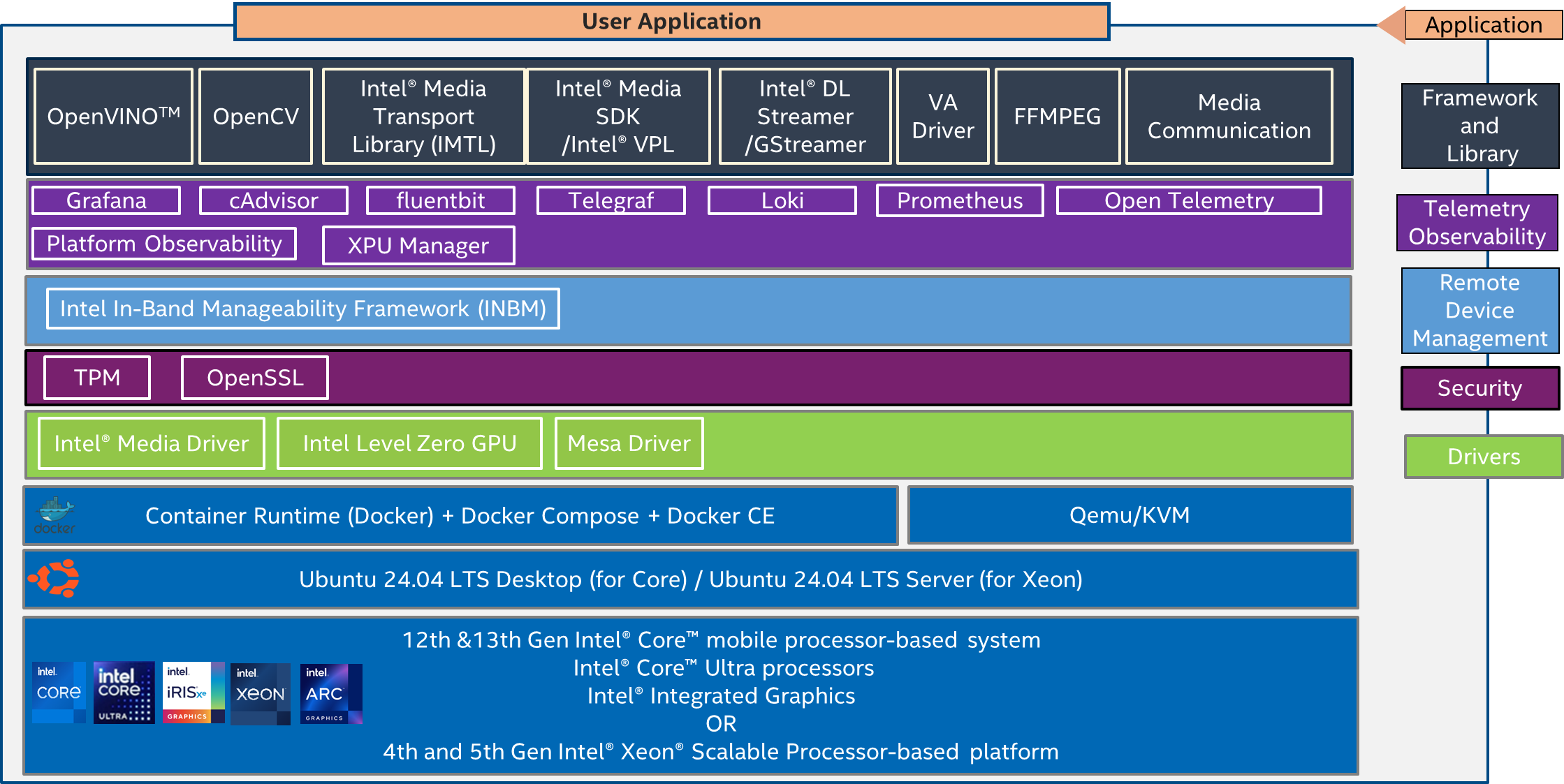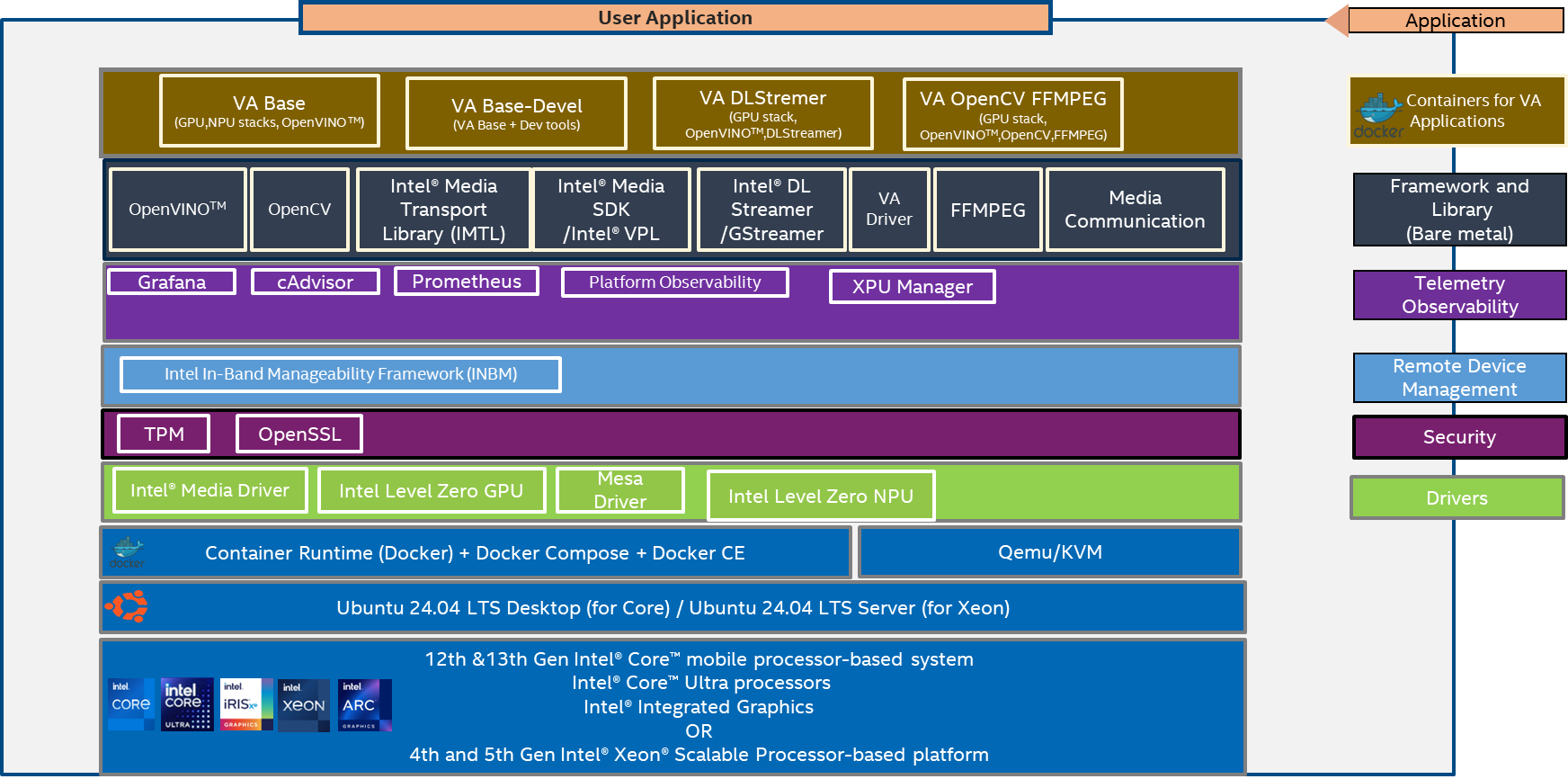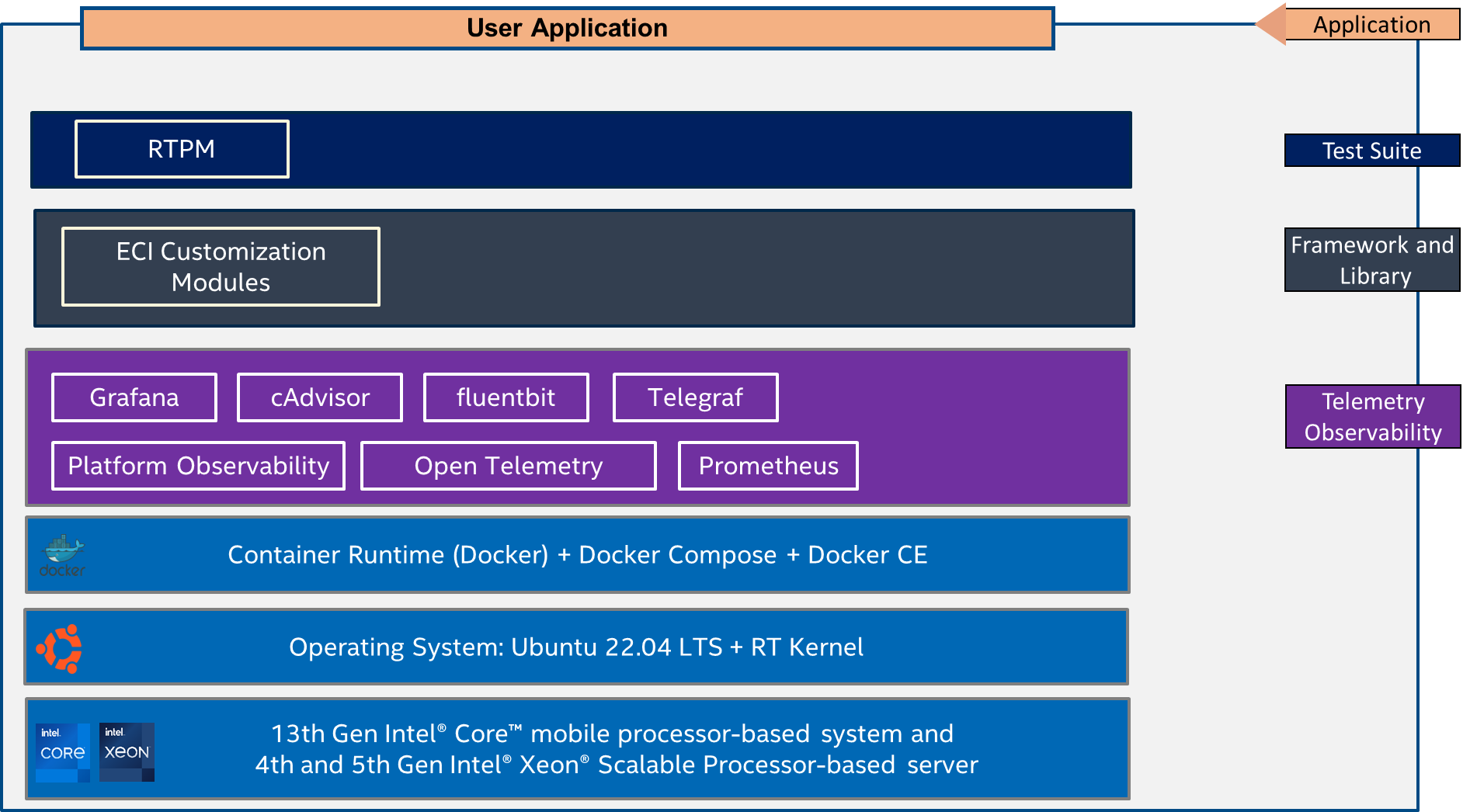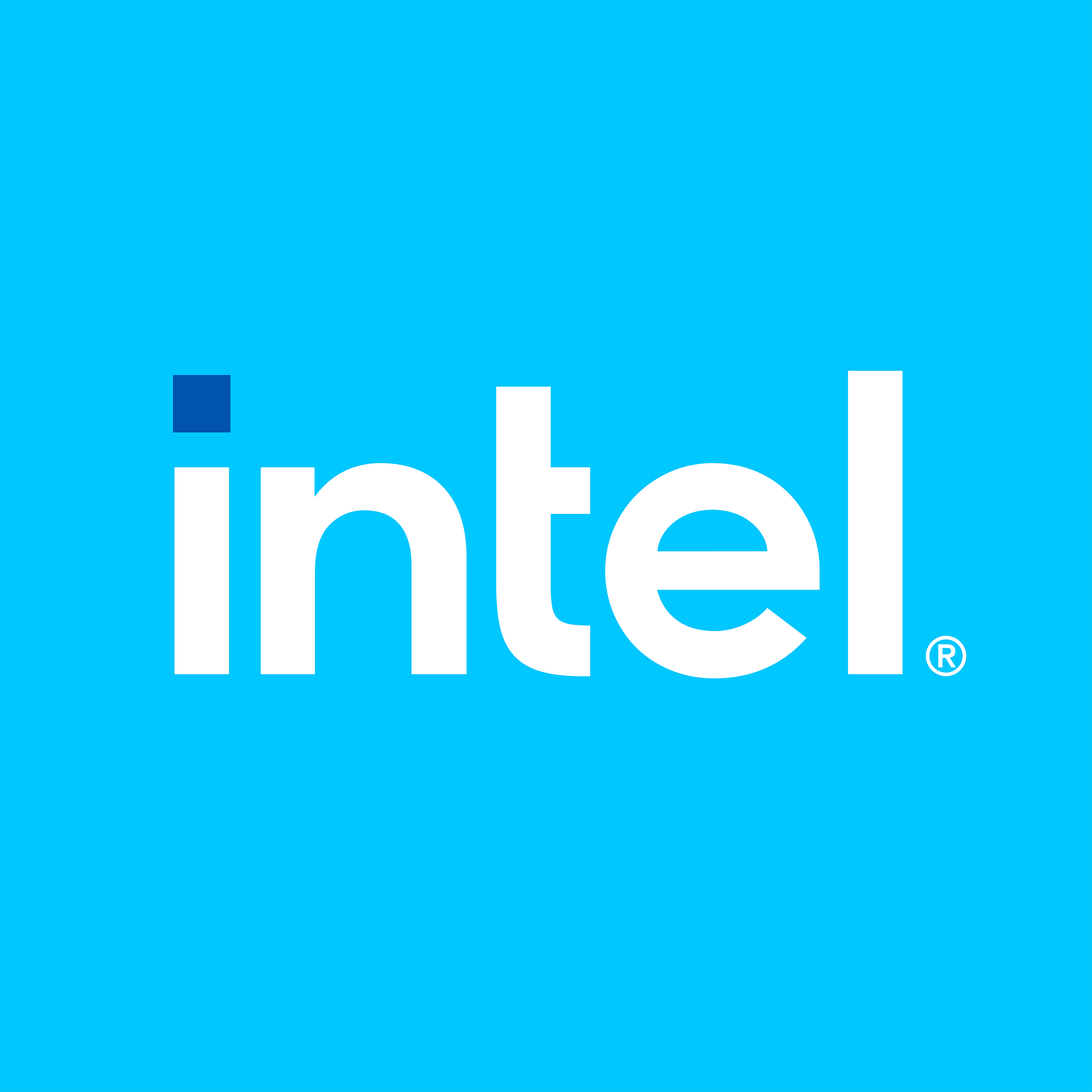Intel® Edge Device Enablement Framework (EEF)#
Provides a set of curated, validated infrastructure Profiles for edge applications.
Overview#
EEF Release - 24.11
The Intel® Edge Device Enablement Framework (EEF) delivers a set of curated, validated infrastructure stacks (aka profiles), providing a runtime for edge applications. It is built on a modular framework where each node is based on a common foundation of hardware, OS, and container runtime.
This document is a quick start guide to configure and deploy nodes using the Intel® Edge Device Enablement Framework on Intel® Core™ and Intel® Xeon® Scalable processors with Intel® Iris® Xe Integrated Graphics for Core platform.
How It Works#
This release of the Edge Device Enablement Framework currently supports three curated profiles tailoring mainly the needs of Video Analytics (VA) and industrial controller workloads.
Profile Name |
Description |
|---|---|
Profile 1: Video Analytics (VA) Enablement Node K8s Profile |
- This profile has Video Analytics and Observability components along with the RKE2 K8s Cluster in a multi node |
Profile 2: Video Analytics (VA) Enablement Node Profile |
- This profile has Video Analytics and Observability components installed on Bare metal for Intel® Core and Intel® Xeon® systems. |
Profile 3: Real Time (RT) Enablement Node Profile |
- This profile has RT kernel related components such as Real-Time Performance Measurements and Intel® Edge Controls for Industrial (ECI) customization with Ubuntu RT |
Main Supported Features#
Category |
Feature |
|---|---|
Hardware |
- Support for 4th & 5th Gen Intel® Xeon® Scalable processor |
OS |
- Ubuntu 24.04 |
CAAS |
- Model: Bare Metal; containerized/virtualized |
Observability/Telemetry |
- Aggregate/query telemetry (e.g. Prometheus) |
Security |
- Secure Boot (documentation) (Enabled for SPR, RPL. Not supported on MTL internal SKUs) |
Framework |
- OVPL; OpenVINO LTS; DLStreamer; GStreamer; Graph Compute Runtime; OpenCV with Ffmpeg; IMTL |
Key Hardware Elements Supported#
Hardware Element |
Description |
|---|---|
Processor |
- 4th & 5th Gen Intel® Xeon® Scalable processors |
Supported – Reference Platforms & Commercial HW |
- 4th & 5th Gen Intel® Xeon® Scalable processors on Dell PowerEdge R760 |
Network |
- Intel Integrated i229 |
GPU |
- Intel® Iris® Xe Graphics (integrated with 13th Gen Intel® Core™ mobile processor) |
Key Software Capabilities Updates#
Capability |
Software Packages |
|---|---|
Latest Software Support Summary |
- Intel® Platform Observability 1.3.0 |
Intel® Edge Device Enablement Framework Profile Architecture#



Hardware Bill of Materials (HBOM)#
Feature |
Profile 1 |
Profile 2 |
Profile 3 |
|---|---|---|---|
Supported Target Platforms |
4th & 5th Gen Intel® Xeon® Scalable Processor-based server (Dell PowerEdge R760 BIOS version) |
- 4th & 5th Gen Intel® Xeon® Scalable Processor-based server (Dell PowerEdge R760 BIOS version) |
- 4th & 5th Gen Intel® Xeon® Scalable Processor-based server (Dell PowerEdge R760 BIOS version) |
GPU |
N/A |
- Intel® Iris® Xe Graphics (integrated with 13th Gen Intel® Core™ mobile processor) |
- Intel® Iris® Xe Graphics (integrated with 13th Gen Intel® Core™ mobile processor) |
Storage |
- Minimum: 128 GB |
- Minimum: 128 GB |
- Minimum: 128 GB |
Memory |
128 GB |
- Core: 64 GB |
- Core: 64 GB |
Ethernet Adapter |
- Intel integrated i229 |
- Xeon: |
- Xeon: |
Software Bill of Materials (SBOM)#
Feature |
Profile 1 |
Profile 2 |
Profile 3 |
|---|---|---|---|
Observability & Telemetry |
- Platform-Observability |
- Platform-Observability |
- Platform-Observability |
Frameworks/ Test Suite |
- OpenVINO™ Toolkit |
- OpenVINO™ Toolkit |
Real-Time Performance Measurement (RTPM) |
Remote Device Management |
Intel In-Band Manageability Framework |
Intel In-Band Manageability Framework |
N/A |
Kubernetes Security Service Mesh |
- Istio operator |
||
Power Management |
- Intel Power Management |
||
Libraries |
- GPU A780 |
- FFmpeg |
ECI-Customization |
Networking & Connectivity |
N/A |
N/A |
N/A |
Security |
- OpenSSL |
- TPM |
N/A |
Operators & Device Plugins |
- Calico |
N/A |
N/A |
Scheduling |
N/A |
N/A |
N/A |
Orchestration |
RKE2 Agent |
N/A |
N/A |
Container Runtime |
Container-D |
Docker Compose |
N/A |
Virtualization |
- QEMU-KVM |
QEMU-KVM KVM |
N/A |
Kernel |
6.8 |
6.8 (Xeon Server), 6.11 (Core Desktop) |
5.15-realtime |
OS |
Ubuntu 24.04 |
Ubuntu 24.04 |
Enabling of Time of Day (TOD) Provisioning#
The Intel® Edge Device Enablement Framework offers the possibility to enable the feature Time of Day (TOD) provisioning. It is implemented with the Intel® Infrastructure Power Manager (IPM) technology. This software allows power management provisioning to save power at a specific time of day when Edge Node’s may be unused or underutilized. This feature delivers power savings during non-peak hours for Edge services. You can install the feature on bare metal once you have completed the deployment of the Edge Node. To install the feature please follow the steps in Section 6
